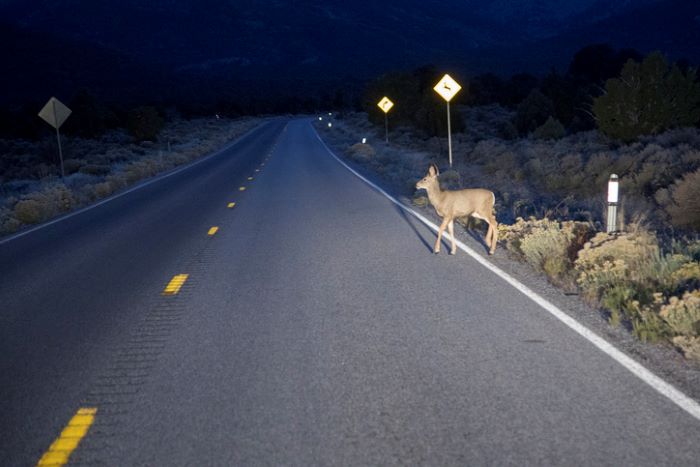WASHINGTON — The U.S. Department of Transportation’s Federal Highway Administration (FHWA) has announced $110 million in grants for 19 wildlife crossing projects in 17 states, including four Indian Tribes.
The funding is made possible by a new program in President Biden’s Bipartisan Infrastructure Law (BIL) and can support projects that construct wildlife crossings over and below busy roads, add fencing and acquire tracking and mapping tools, according to a news release.
Overall, BIL makes a total of $350 million available over five years under the Wildlife Crossings Pilot Program.
Each year, it is estimated that there are more than one million wildlife vehicle collisions in the U.S. Wildlife-vehicle collisions involving large animals result in injuries to drivers and their passengers, representing approximately 200 human fatalities and 26,000 injuries to drivers and their passengers each year. These collisions also cost the public more than $10 billion annually. This includes economic costs caused by wildlife crashes, such as loss of income, medical costs, property damage, and more.
“Every year, too many Americans are injured or killed in crashes involving cars and wildlife, especially in rural areas – but President Biden is tackling this challenge through these first-ever roadway safety grants,” said U.S. Transportation Secretary Pete Buttigieg. “The projects we’re funding today in 17 states will reduce collisions between drivers and wildlife and save American lives.”
“We are pleased to announce the first round of grants under the Wildlife Crossings Pilot Program to projects that will significantly reduce the number of collisions between motorists and wildlife,” said Federal Highway Administrator Shailen Bhatt. “These roadway safety investments will ensure that motorists and wildlife get to their destinations safely and are a win-win for safety and the environment.”
Project selections in this round of grants include:
- The Arizona Department of Transportation will receive $24 million for the Interstate-17 (I-17) Munds Park to Kelly Canyon Wildlife Overpass Project. The project includes nearly 17 miles of new wildlife fencing tying in existing culverts, escape ramps and double cattle guards to reduce wildlife vehicle collisions along Interstate 17 while increasing habitat connectivity for local species, particularly the elk.
- The Wyoming Department of Transportation will receive $24.4 million to build an overpass, several underpasses, and high-barrier wildlife fencing along 30 miles of US 189 in southwest Wyoming, a rural highway corridor with a high number of wildlife-vehicle collisions.
- The Colorado Department of Transportation will receive $22 million to build a dedicated overpass on Interstate 25 between Denver and Colorado Springs, the state’s two most populous cities. Once completed, the Greenland Wildlife Overpass will be one of the largest overpass structures in North America, spanning six lanes of interstate highway. It will help reduce vehicle collisions with elk and mule deer along I-25 and connect vital habitats on both sides of the highway from the Great Plains to the Rocky Mountains.
- The Stillaguamish Tribe in Washington State will receive $8.5 million to design and construct a wildlife overpass with fencing on rural State Route 20 in Skagit County. The Red Cabin Creek Wildlife overpass at Milepost 76.2 will span two lanes of traffic and is aimed at helping multiple species, including elk.
- The California Department of Transportation will receive $8 million to reduce wildlife vehicle collisions and connect animal habitats between protected State Park lands on either side of US 101. Improvements include increasing the size of an existing culvert and installing 2.5 miles of fencing at road crossings, allowing for safer roads for drivers.
- The Commonwealth of Pennsylvania will receive $840,000 to develop a comprehensive statewide strategic plan with the Pennsylvania Department of Transportation, Pennsylvania Department of Conservation and Natural Resources, Pennsylvania Game Commission, and others to address the wide-ranging challenges and opportunities associated with the safe management and stewardship for wildlife crossings across the state.
The full list of project selections can be found at Wildlife Crossing.
Born in Pine Bluff, Arkansas, and raised in East Texas, John Worthen returned to his home state to attend college in 1998 and decided to make his life in The Natural State. Worthen is a 20-year veteran of the journalism industry and has covered just about every topic there is. He has a passion for writing and telling stories. He has worked as a beat reporter and bureau chief for a statewide newspaper and as managing editor of a regional newspaper in Arkansas. Additionally, Worthen has been a prolific freelance journalist for two decades, and has been published in several travel magazines and on travel websites.








